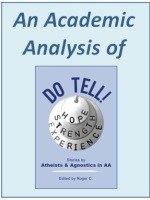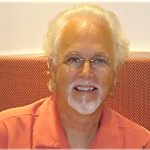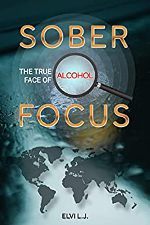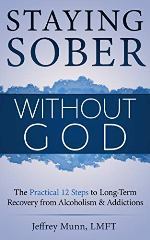Chapter 5:
Do Tell! Stories by Atheists and Agnostics in AA
Russ H.
On a sunny Saturday morning at the end of July, 1995, I pulled into the cul-de-sac where I lived with my wife of 19 years and our two teenage children. My sister’s van was parked in the driveway. A police squad car occupied the spot in front of our house forcing me to park across the street. I don’t recall how long I had been gone. It might have been a few hours or a few days. As I walked across the front yard I noticed that the van in the driveway was full of stuff – our stuff – and I wondered “are we going somewhere?” As I walked in the front door I was greeted by a police officer who asked me my name. The pivotal event that defines the end of the beginning of my AA story was about to unfold.
After identifying myself to him, the policeman told me that my wife and my sister were packing some things and would then be leaving with the children. He explained that he was there to make sure I didn’t do anything to make this process any more difficult for them than it already was. I was instructed to take a seat in the nearest chair and stay there until my family was gone. The 28 years leading up to this moment are littered with countless incidents of blackout drinking and outrageous behavior – usually accompanied by negative consequences. The common thread through all of those years, the singular fact that drove me to my bottom, can be summed up neatly: having that police officer there that morning was a very good idea.
They left. I had no idea where they had gone. To reach my children I had to call my sister. She would then call them. If they felt like talking they would call me. Talking to my wife was not an option. I spent the rest of that weekend in miserable solitude mulling over a brand new realization. The way I was leading my life simply was not working. As so often mysteriously happens to alcoholics approaching their bottoms, I had acquired a big book and a schedule of AA meetings in my area. I had looked at them very briefly – just long enough to know that I was not interested in what they had to offer. Now, suddenly, there was a glimmer of interest in the meeting schedule. On Monday morning I called in sick and went down to a noon meeting at the nearest AA meeting place.
The big book tells us that “If you want what we have and are willing to go to any length to get it, then you are ready to take certain steps”. The unsteady steps I took as I walked into that meeting were the first evidence of my readiness to go to any length. I had no expectations. I simply didn’t know what else to do. I wound up going to three meetings that day.
I met people who said they were alcoholics and drug addicts. They told their stories and shared openly about what their lives had been like and what they were like now. I saw in them what it looks like when people like me stop drinking and using. I learned from them what it is like to speak frankly and without embarrassment about who we really are, what we have really done, how we really feel.

A doctoral dissertation called “Experiences of Atheists and Agnostics in AA” was recently submitted and it is based entirely on the book Do Tell. For more information click on the above image.
They allowed me to talk. They listened as I revealed anger, fear and shame and they were neither shocked nor disapproving. It dawned on me that I desperately needed to be with them. They were eager for me to join them. They didn’t require anything from me other than my own willingness to belong. The friendship and love from those people, and others in the years that have followed, changed my life.
At some point that day I realized that I wanted what those people had – to be a clean and sober person – more than I had ever wanted anything in my life. I had come to believe – not in God or spirituality – but simply that it really was possible for me to recover from alcoholism and drug addiction.
I got home late that evening. The hope and optimism I had felt while in the company of my new-found sober friends gave way to loneliness and desperation. Tears became weeping which became the convulsive sort of sobbing that makes it difficult to breathe and nearly impossible to speak. I found myself crying out “God help me. I don’t know what to do. Show me what to do.” Surprising words, perhaps, for an atheist to utter but that is what happened. They say there are no atheists in foxholes. I was in a metaphoric foxhole that evening. Apparently, not only are atheists sometimes in foxholes but some of us also sometimes pray.
The next morning I went in to work. I stopped first to speak to my boss. I told him that I was an alcoholic and drug addict. He was used to seeing me work long hours. I said I would now only be able to give him 40 hours per week – that my recovery had become my first priority. I thought there was a good chance I might be fired. Instead he looked at me and said “You look like a man who has had the weight of the world lifted from your shoulders. You have been a valuable asset here and we will stand by you now.”
Next I visited his boss, a woman named Esther. I started to tell her the same story but I had hardly begun before she stopped me and said “Well, you probably should try to go to 90 meetings in 90 days. See if you can find a sponsor. I will try to get the company to cover the cost of a 30 day rehab. If they will you should do that.” She sounded to me like she might be a recovered alcoholic herself although I learned later that day she was not. I was overcome with gratitude for the unconditional support I was receiving and told Esther I could hardly believe how wonderfully people were treating me that morning. She just shook her head and said “You expect too little from people”. How true I now realize that was.
I left her office and went to my own. As I sat there, trying to maintain composure, my boss walked in and put a key to his house down on my desk. He said “Your wife and kids need your house more than you do. Come stay with me until you get back on your feet”. I spent that night and the next several weeks accepting his generous offer. A few minutes later a coworker dropped by. News travels fast in a workplace where most people are housed in cubicles. She said she’d heard what was up and asked “So, you’re a 12-Stepper?” Of course, I really wasn’t but said I was. She smiled and said “Me too. Mine is a different ‘-A’ but we use the same 12 Steps.” Until then she had been a casual friend. That day she became a trusted confidant.
I left the office in time to make the 5:30 meeting near my home. When I arrived a man was waiting for me at the entrance to the room. He introduced himself as Scott, Esther’s son. Scott was an alcoholic and addict who’s “other” drug of choice was the same as mine. He had been clean and sober for 10 years and lived about six blocks down the road from me. Within a couple of weeks he became my first sponsor.
When I tell this story at AA meetings it is not uncommon for people to come up to me and say. “You’re an atheist? How is that possible? You prayed for guidance and the very next day you did things you formerly would not have considered doing. Your prayer was answered. It may not have been a burning bush but what happened to you was surely a miracle.” I’m inclined to agree that what happened feels miraculous. However, I simply do not believe in supernatural phenomena. When I hit my thumb with a hammer I am likely to cry out, “God damn it!” Driven to hopeless despair that evening I cried out “God help me!” The prayer was genuine but it was not a declaration of faith.
That marriage that seemed hopelessly doomed in July was reunited shortly before Christmas after a five month separation. I ecstatically shared my new and improved AA story which now featured restored domestic harmony and renewed family bonds. Then one day in early 2000 I returned from a two week business trip to learn that my wife had fallen in love with a friend of ours. For the first time as a sober man I was confronted with a devastating personal setback. It was not an easy time. I did not handle it gracefully. But I did share the experience with my sober friends. I let them see me suffer. Emotional pain has a tendency to rapidly morph into anger for me – even today – and my friends endured my anger too. As before, they did not turn away or express disapproval. I did not drink or use. Eventually the pain subsided. Life became, at first, tolerable then ultimately enjoyable once again.
I stayed clean and sober on the strength of the fellowship alone for over two years before I approached the 12 Steps with any real interest. It was then that I met the man who became my second AA sponsor. I have now known him for nearly 18 years. Although he will always be my sponsor, I no longer see him as a mentor. He is my trusted friend and one of the men in my life whom I love and know that I am loved by. He shared with me a point of view about life and recovery and AA that was, in large part, passed on to him by his sponsor. It is a point of view that resonates deeply with me and I pass it along to other men if they express an interest. It is not based on the 12 Steps as a recipe or formula for achieving sobriety.
The 12 Steps embody principles of a self-examined life that are neither unique nor new. They direct us to acknowledge who and what we are, to look for and rely upon help from outside ourselves, to examine past actions and motives, to understand that what we say and do may have greater or lesser merit, to seek to speak and act in ways that have greatest merit, to acknowledge our shortcomings, to make retribution for harm done to others whenever possible and to open our minds and hearts to great things we have not yet considered or felt. To adopt these goals (whether or not we try to achieve them specifically as prescribed in the 12 AA Steps) is a noble calling.
The notion that we should seek to speak and act in ways that have greatest merit implies that there is, in this world, an inherent morality. I believe this to be the case. Many AA members speak of seeking to do God’s will. They are using different language based on a different world view but, it seems to me, they are saying essentially the same thing that I am saying. I have heard it said that there really is no “them” in AA. There is just “us.” This applies to the whole world not just to AA.
What it’s like now is a moving target. The ups and downs of being human have not been supplanted by some persistent state of happy and joyous freedom.
Sustaining long term sobriety is inevitably accompanied by growing older. Both processes seem, generally, to smooth rough edges and round off sharp corners. The emotional extremes of my drinking and using days have given way to the much less dramatic emotional extremes of life as a sober and recently retired person. More and more the virtues of “easy does it” and “live and let live” seem to be driving my daily existence.
Sometimes I wonder why I still call myself an alcoholic. The urge to drink or use drugs vanished entirely many years ago. An alcoholic, my thinking goes, is not someone who chooses to drink but, rather, someone who is unable to choose not to drink. By that definition I am now the opposite of alcoholic. Then I remember. “My name is Russ and I am an alcoholic” is by far the most powerful admission of my life. It was the first step of my journey into a life of sobriety. Today it continues to be the simple prelude to new friendships and astonishing experiences in Alcoholics Anonymous. It connects who I am now and what it is like now to who I was during those precious 28 years of drinking and using. Every one of those years and all the things that happened during them are bricks and mortar in the foundation of my life today.
![Do Tell! [Front Cover]](https://nrdblogs.nationalrehabdirectory.net/wp-content/uploads/2020/09/Do-Tell-Full-Blue-Front-Cover-200-FRAMED.jpg) This is a chapter from the book: Do Tell! Stories by Atheists and Agnostics in AA.
This is a chapter from the book: Do Tell! Stories by Atheists and Agnostics in AA.
The paperback version of Do Tell! is available at Amazon. It is also available via Amazon in Canada and the United Kingdom.
It can be purchased online in all eBook formats, including Kindle, Kobo and Nook and as an iBook for Macs and iPads.
The post Atheist in a Foxhole first appeared on AA Agnostica.






 The clarity of sobriety made me realize, David, you have other obsessive/addictive issues. Father was an alcoholic? Try Adult Children of Alcoholics. Trauma based sexual dysfunction? Perhaps Sex Addicts Anonymous would help. Coffee addiction? Check out Caffeine Addicts Anonymous. Even though narcotics are not a personal issue for me, detox and an in-patient facility exposed me to Narcotic’s and Cocaine Anonymous meetings and literature.
The clarity of sobriety made me realize, David, you have other obsessive/addictive issues. Father was an alcoholic? Try Adult Children of Alcoholics. Trauma based sexual dysfunction? Perhaps Sex Addicts Anonymous would help. Coffee addiction? Check out Caffeine Addicts Anonymous. Even though narcotics are not a personal issue for me, detox and an in-patient facility exposed me to Narcotic’s and Cocaine Anonymous meetings and literature.